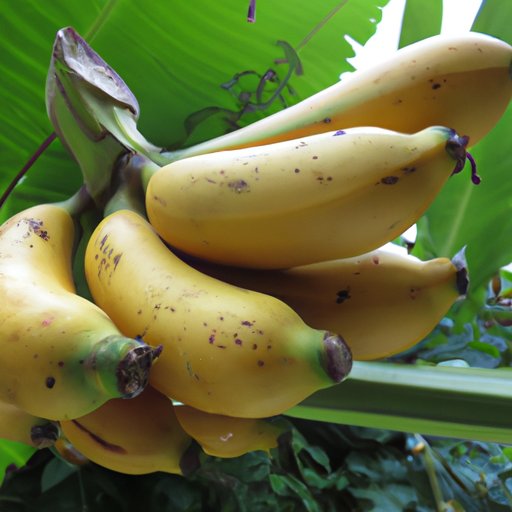Introduction
Bananas are one of the most popular fruits in the world, and for good reason. They’re delicious, convenient, and incredibly versatile. But are ripe bananas good for you? In this article, we’ll explore the nutritional benefits, health benefits, and potential risks associated with eating ripe bananas.
What are Ripe Bananas?
Bananas come in all shapes and sizes, but the ripeness of a banana is determined by its color. A ripe banana will be yellow with a few brown spots, while an overripe banana will have mostly brown spots. The riper a banana is, the sweeter it will taste.
Overview of the Health Benefits of Eating Ripe Bananas
Eating ripe bananas can provide a variety of health benefits. Bananas are packed with vitamins, minerals, dietary fiber, and antioxidants that can help improve your overall health. They also have a low calorie count and high nutritional value, making them a great snack choice.

Exploring the Nutritional Benefits of Ripe Bananas
Ripe bananas are an excellent source of several key vitamins and minerals. They are rich in vitamin B6, potassium, magnesium, and manganese. Vitamin B6 is important for healthy nerve and brain functioning, while potassium helps regulate blood pressure. Magnesium and manganese are essential for bone health.
Ripe bananas are also a good source of dietary fiber, which is important for healthy digestion. Eating enough fiber can help reduce your risk of developing digestive issues such as constipation and irritable bowel syndrome. Bananas also contain antioxidants, which can help protect your cells from damage caused by free radicals.

Ripe Bananas: A Healthy Snack Choice
If you’re looking for a healthy snack, ripe bananas are an excellent choice. They have a low calorie count (about 105 calories per medium-sized banana) but are still packed with nutrients. Plus, they’re easy to carry and don’t require any preparation.

The Health Benefits of Eating Ripe Bananas
Eating ripe bananas can provide a variety of health benefits. Here are some of the most notable ones:
- Improved digestion: The dietary fiber found in ripe bananas can help keep your digestive system running smoothly.
- Improved heart health: The potassium in ripe bananas can help reduce your risk of heart disease and stroke.
- Lower risk of diabetes: Eating ripe bananas regularly can help reduce your risk of developing type 2 diabetes.
How to Tell When a Banana is Ripe and Ready to Eat
Knowing when a banana is ripe and ready to eat can be tricky. Here are a few tips to help you identify a ripe banana:
- Color: Look for a yellow banana with a few brown spots. If the banana is mostly brown, it’s likely overripe.
- Texture: Gently press the banana with your thumb. If it gives slightly, it’s ripe. If it’s too soft or mushy, it’s overripe.
What Makes Ripe Bananas Good for You?
Ripe bananas are a great source of several important nutrients. Vitamin B6 is essential for healthy nerve and brain functioning, while potassium helps regulate blood pressure. The dietary fiber in ripe bananas can help improve digestion, and the antioxidants can help protect your cells from damage.
The Role of Ripe Bananas in a Balanced Diet
Ripe bananas can be a healthy addition to your diet, but they should not be the only fruit you eat. To get the most out of your diet, it’s important to include a variety of foods. Eating a variety of fruits, vegetables, whole grains, and lean proteins can help ensure you’re getting all the nutrients your body needs.
It’s also important to practice moderation when it comes to eating ripe bananas. Eating too many can lead to weight gain and other health problems. Aim to limit your intake to one or two ripe bananas per day.
What Are the Risks of Eating Overripe Bananas?
Though eating ripe bananas can provide a variety of health benefits, eating overripe bananas can have some risks. For starters, overripe bananas are more likely to be contaminated with bacteria, increasing your risk of food poisoning. Additionally, overripe bananas have a higher sugar content, which can cause blood sugar levels to spike.
Conclusion
Ripe bananas are a nutritious, delicious, and convenient snack. They are packed with vitamins, minerals, dietary fiber, and antioxidants that can help improve your health. Eating ripe bananas can help improve digestion, heart health, and lower your risk of diabetes. However, it’s important to practice moderation and avoid overripe bananas, as they may increase your risk of food poisoning and blood sugar spikes.
(Note: Is this article not meeting your expectations? Do you have knowledge or insights to share? Unlock new opportunities and expand your reach by joining our authors team. Click Registration to join us and share your expertise with our readers.)
